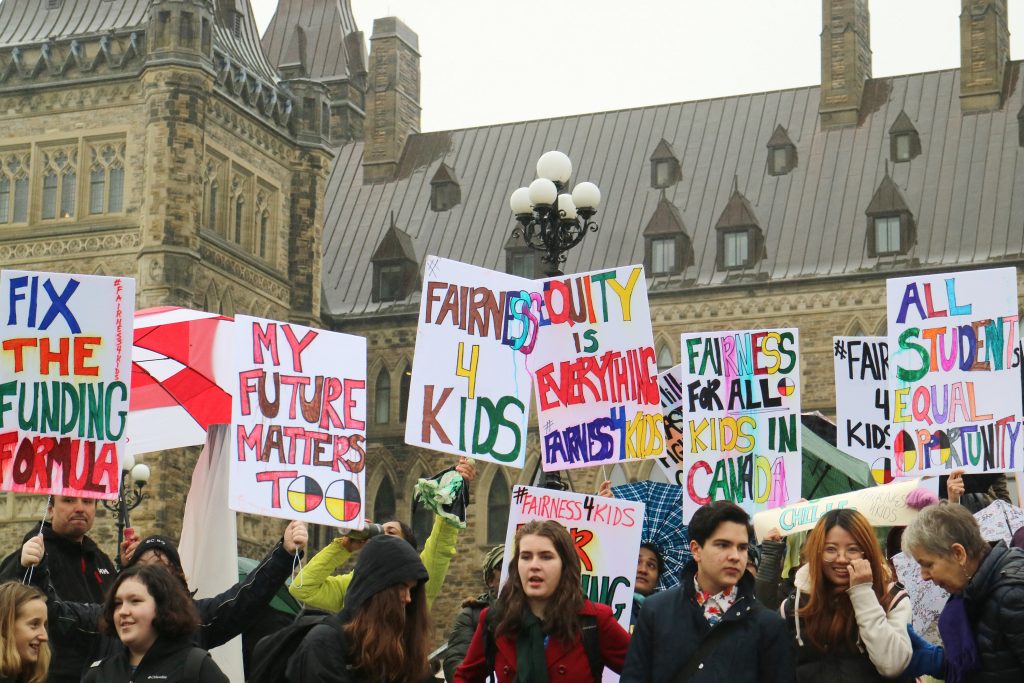Protesters demand fairness for First Nations children
By Vera He
A national day of action on Nov. 2, organized by the Ottawa-based Assembly of First Nations, included a rally on Parliament Hill and calls for immediate action on a Canadian Human Rights Tribunal ruling aimed at transforming the country’s First Nations child welfare services as defined by “Jordan’s Principle.”
Despite the rainy weather, more than 100 people gathered on Parliament Hill to show their support for First Nations children and the creation of a system for Indigenous communities on a par with services available to other Canadian children.
“The Canadian Human Rights Tribunal’s rulings are simple and clear: First Nations children deserve to be treated fairly,” Perry Bellegarde, National Chief of the AFN, said during the rally.
While it took almost a decade for the federal government to respond to a complaint filed in 2007 about First Nations child welfare, it has been more than a year since the CHRT issued its decision on Jan. 26, 2016, and few significant changes to improve the system have been made, critics argue.
According to Bellegarde, Parliament voted unanimously last November to provide an injection of $155 million for First Nations child and family services to immediately implement the goals embodied by Jordan’s Principle, a set of criteria for reinventing the system as advocated by the Centretown-based First Nations Child & Family Caring Society of Canada and upheld by the tribunal.
According to the society’s website, the principle is named in memory of Jordan River Anderson of the Norway House Cree Nation in Manitoba. “Born with complex medical needs,” the society states, “Jordan spent more than two years unnecessarily in hospital while the Province of Manitoba and the federal government argued over who should pay for his at-home care. Jordan died in the hospital at the age of five years old, never having spent a day in his family home.”
Bellegarde said the promised federal infusion of funding represents a “down payment on fairness, justice and an opportunity for a brighter future for our children. They should not have to wait any longer.”
Marc St. Dennis the society’s reconciliation and research coordinator, said this year marks the 10th anniversary of Jordan’s Principle being unanimously supported in the House of Commons.
One of the speakers at the rally, federal Minister of Indigenous Services Jane Philpott, said more than 20,000 cases conforming to the criteria laid out in Jordan’s Principle have been approved across Canada.
Philpott emphasized the importance of First Nations children getting the proper support they need.
“If you know any child that’s not getting the care they need, then you reach out and let us know,” she said. “We are going to make sure they get the care they need.”

Although there have been some improvements on the implementation of Jordan’s Principle, said St. Dennis, the government is still filing an appeal of the latest CHRT decision, seeking concessions with regards to the timeliness of an official response to an individual crisis, which is currently 48 hours.
“For us, it’s problematic because Jordan’s Principle is all about making sure that children receive the services they need in a timely manner,” he said.
Stephanie Hookimaw, a mother from Attawapiskat who lost her 13-year-old daughter to suicide in 2015, said she attended the assembly to show her support for First Nations children.
While Hookimaw is still seeking help to find out what happened to her daughter, she said the rally was powerful because people are uniting to fight for all First Nations children.
“We are calling upon the Canadian government to honour our children and respect their human rights. We are losing so many, so many of our children,” Hookimaw said.
Recognition of past injustices is important for the country, said St. Dennis, especially since Canada has failed to fulfill so many of its previous promises to First Peoples.
“From that recognition,” he said, “we can move forward together and create a better future for everyone.”

